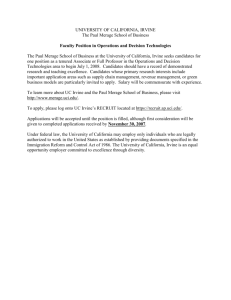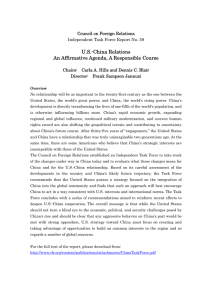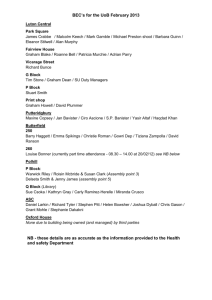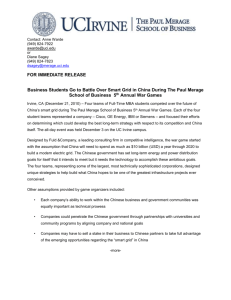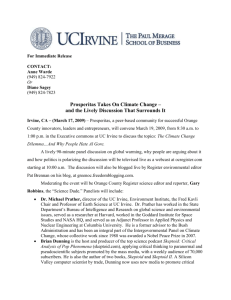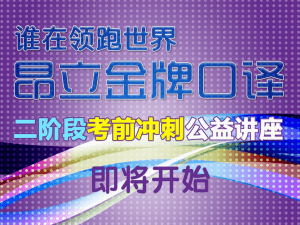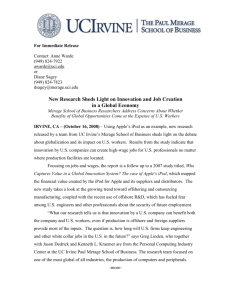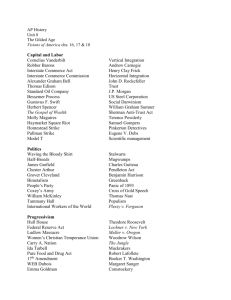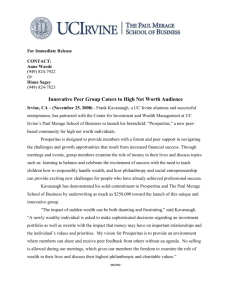U S -China Trade Release Final
advertisement
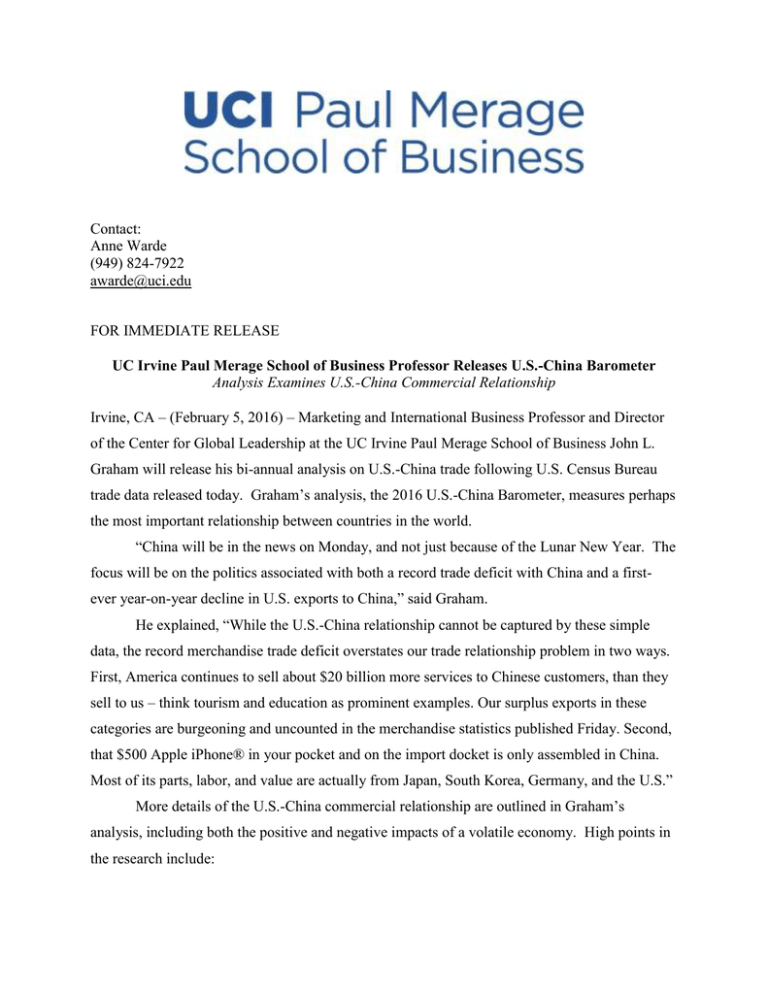
Contact: Anne Warde (949) 824-7922 awarde@uci.edu FOR IMMEDIATE RELEASE UC Irvine Paul Merage School of Business Professor Releases U.S.-China Barometer Analysis Examines U.S.-China Commercial Relationship Irvine, CA – (February 5, 2016) – Marketing and International Business Professor and Director of the Center for Global Leadership at the UC Irvine Paul Merage School of Business John L. Graham will release his bi-annual analysis on U.S.-China trade following U.S. Census Bureau trade data released today. Graham’s analysis, the 2016 U.S.-China Barometer, measures perhaps the most important relationship between countries in the world. “China will be in the news on Monday, and not just because of the Lunar New Year. The focus will be on the politics associated with both a record trade deficit with China and a firstever year-on-year decline in U.S. exports to China,” said Graham. He explained, “While the U.S.-China relationship cannot be captured by these simple data, the record merchandise trade deficit overstates our trade relationship problem in two ways. First, America continues to sell about $20 billion more services to Chinese customers, than they sell to us – think tourism and education as prominent examples. Our surplus exports in these categories are burgeoning and uncounted in the merchandise statistics published Friday. Second, that $500 Apple iPhone® in your pocket and on the import docket is only assembled in China. Most of its parts, labor, and value are actually from Japan, South Korea, Germany, and the U.S.” More details of the U.S.-China commercial relationship are outlined in Graham’s analysis, including both the positive and negative impacts of a volatile economy. High points in the research include: Chinese are coming to America in exploding numbers for both tourism and education, and they all study English in elementary school Life expectancies and consumer purchasing power continue to climb in both countries Internet and mobile phone users continue to grow, and both promote peace and prosperity Corruption (bribery and IP piracy) is declining in both, if only marginally The rise in WTO trade disputes (filed and settled) between the two countries reflects a healthy response to the unavoidable frictions between the two largest economies of the world These improvements are tempered by other factors including: Unemployment continues its gentle rise in China Energy use and the consequent carbon footprints are only marginally declining in the U.S. but burgeoning in China Military spending in China burgeons while America predominates, both disregard domestic welfare Chinese holdings of U.S. Treasuries remain breathtakingly high reflecting that country’s short-term commitment to the commercial relationship and U.S. barriers to Chinese FDI Americans’ travel to China (tourism and education abroad) has stalled American students’ interest in learning Chinese is stalling as well Perhaps the best news is reflected in the teaming of American and Chinese inventors – the remarkable rise in technological collaboration is reflected by 1681 U.S. patents awarded to such teams in 2015 “The good news is, the blossoming overall two-way trade ($598 billion in 2015) strengthens U.S.-China commercial interdependence while also helping to promote peace between the two nations along the way,” stated Graham. The full details of the 2016 U.S.-China Barometer can be found at merage.uci.edu/CalendarAndNews/PressReleases/PressReleases.aspx. About John Graham John Graham is professor emeritus, Marketing and International Business, and Faculty Director of the Center for Global Leadership at the UC Irvine Paul Merage School of Business. He is an expert in global marketing, international business negotiations, and business in Greater China and Japan, and he has co-authored several books including: International Marketing (with Philip R. Cateora and Mary C. Gilly), McGraw-Hill, 14th edition, 2009; Global Negotiation: The New Rules (with William Hernandez Requejo), Palgrave Macmillan, 2008; Doing Business with the New Japan (with James Day Hodgson and Yoshihiro Sano), Rowman & Littlefield, 2008; China Now: Doing Business in the World’s Most Dynamic Marketplace (with N. Mark Lam), McGraw- Hill, 2007; and Together Again: A Creative Guide to Successful Multigenerational Living (with Sharon Graham Niederhaus), M. Evans, 2007. Marketing. See GlobalNegotiationResources.com and TogetherAgainBook.com for details. Graham has also published extensively in academic and management journals including Harvard Business Review, MIT Sloan Management Review, Journal of Marketing, Management Science, Marketing Science, Journal of Consumer Research, Journal of International Business Studies, Strategic Management Journal, and the Journal of Higher Education. He has been interviewed by numerous local, national, and international broadcast media outlets, including “NBC Nightly News” and the BBC, and written several articles for the Los Angeles Times, La Opinion, and the New York Times. Graham has served as a consultant for executive groups for major corporations, associations and institutions including: Toyota Motor Sales, AT&T, the United States Trade Representative, the United States Institute of Peace, and The National Institute of Health. About The Paul Merage School of Business at UC Irvine The Paul Merage School of Business at UC Irvine offers four dynamic MBA programs – plus PhD, specialty masters and undergraduate business degrees – that graduate business leaders with the exceptional ability to help grow their organizations through strategic innovation, analytical decision-making, information technology and collaborative execution. While the Merage School is relatively young, it has quickly grown to consistently rank among the top AACSB-accredited programs through exceptional student recruitment, world-class faculty, a strong alumni network and close relationships with both individual business executives and global corporations. Additional information is available at merage.uci.edu. ### Editor’s Note: John L. Graham is available for comment via email at jgraham@uci.edu or by phone at 949-824-8468.
